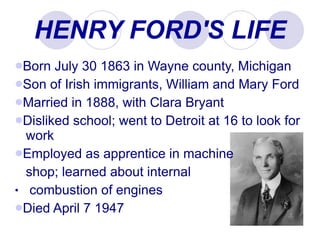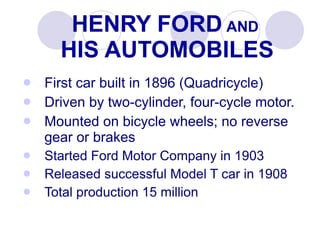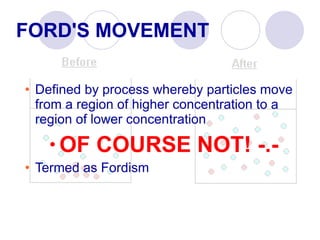fordism
- 1. E. LIT PROJECT MOVEMENTS WHAT MOVEMENT?
- 3. SO WHO IS IT? HENRY FORD!
- 4. HENRY FORD'S LIFE Born July 30 1863 in Wayne county, Michigan Son of Irish immigrants, William and Mary Ford Married in 1888, with Clara Bryant Disliked school; went to Detroit at 16 to look for work Employed as apprentice in machine shop; learned about internal combustion of engines Died April 7 1947
- 5. HENRY FORD AND HIS AUTOMOBILES First car built in 1896 (Quadricycle) Driven by two-cylinder, four-cycle motor. Mounted on bicycle wheels; no reverse gear or brakes Started Ford Motor Company in 1903 Released successful Model T car in 1908 Total production 15 million
- 6. FORD'S MOVEMENT Defined by process whereby particles move from a region of higher concentration to a region of lower concentration OF COURSE NOT! -.- Termed as Fordism
- 7. SO WHAT IS FORDISM? Coined by Antonio Gramsci Economic philosophy That thought prosperity and high corporate profits could be achieved through paying the workers high wages
- 8. FORDISM??? 3 Things are meant by it. Way of organising working process based on concept of assembly line within single production unit. Thus mass production carried out. Economic model based not only on mass production but also on mass consumption. Assumed a growing capacity for consumption by growing sectors of the population.
- 9. FORDISM?? Implies a social and political system. Public authorities supposed to make labour available, channel wealth towards various social classes that were going to consume. Also enhanced efficiency of labour force by providing welfare services such as housing, health care and social protection.
- 10. HOW DID FORDISM COME ABOUT? Established around 1913/14, when Henry Ford introduced assembly line at his factory During which, he introduced $5/day pay And also introduced 8 hour work day
- 11. HOW DID IT SPREAD? The practice of Fordism began in the United States When the US pulled herself out of the Great Depression, hope of the theory revived Europe adopted it after the Depression Marxists also adopted fordism Used it as a term for a “form of production”
- 12. EFFECTS OF FORDISM Little workplaces in rural regions unable to win competition of the larger factories in cities. Cities grew very fast; mass migration Companies choose to build factories in cities because most of the people are there. City dependent of companies; they served employment. In and around the cities arose great complexes of industry.
- 13. OUR RESPONSE They had no right, they had no say, and they longed to be free one day A smart way to minimise cost while maximising end product. Feel that would improve productivity Would be good if applied in school context SERIOUSLY… -.-lll
- 15. CREDITS http://www.highbeam.com/doc/1O15-Fordism.html http://www.directessays.com/viewpaper/56246.html http://legacy.lclark.edu/~soan221/fordism2.html And many more...
- 16. THANK YOU!















